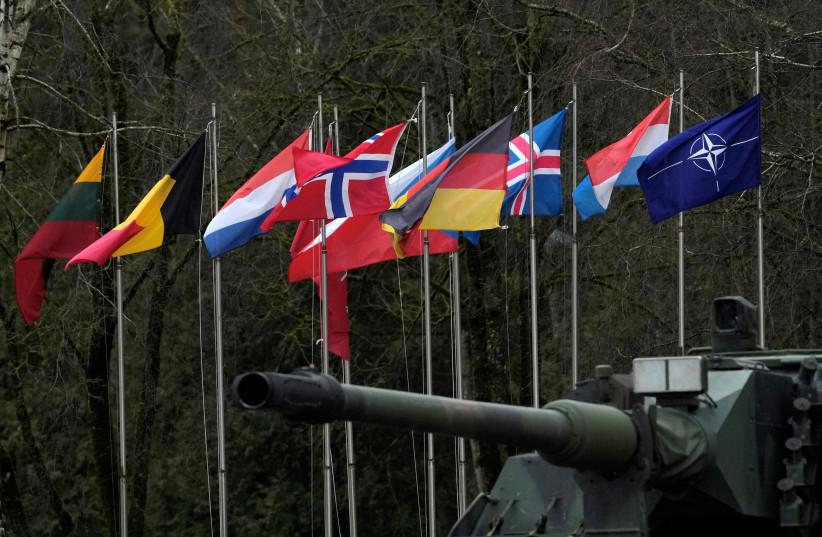The upper house of Russia's parliament approved the use of the Russian Armed Forces outside the country on Tuesday evening, hours after Polish Defense Minister Mariusz Błaszczak stated that Russian troops had already entered territories held by Ukrainian separatists and Western nations began preparing defenses in the region.
Putin will be the one to determine the scale of the deployment of Russia's forces and where and for how long they will be deployed, according to the parliamentary resolution. Chairwoman of the Federation Council, Valentina Matviyenko, stated after the vote that the approval was granted based on the fact that these will be "peacekeeping forces," according to the Russian TASS news agency.
"We can confirm that Russian forces entered the territory of the self-proclaimed republics. So they violated the borders of Ukraine, and international law was violated. This type of activity is not allowed," tweeted the Polish Defense Ministry on Tuesday morning.
The news comes as Russian-backed separatist leader Denis Pushilin said on Tuesday that Moscow formally recognized the breakaway region of Donetsk within the wider boundaries of eastern Ukraine's Donetsk region, much of which is controlled by Ukrainian forces.
Speaking on Russian state television, Pushilin said the matter of the territory not controlled by separatists would be resolved later.

"The border issue is not simple; it will be resolved later," he said.
The president of the Russian-occupied Abkhazia region of Georgia announced on Monday that security services in the de-facto state were placed on heightened combat readiness in order to "avoid provocations from Georgia." He added that he was ready to send troops to the breakaway territories in eastern Ukraine as well.
Satellite images shared on Tuesday night showed a new deployment of more than 100 military vehicles and dozens of troop tents in southern Belarus near the Ukraine border, a private US company said. The images also showed a new field hospital and heavy equipment transporters in western Russia close to the border with Ukraine.
During a speech on Monday night, Putin lamented that republics were allowed to leave the Soviet Union, calling the granting of sovereignty to these republics "truly fatal."
NATO prepares deterrence measures
Germany could send more troops to Lithuania and other countries on NATO's eastern flank after Russia formally recognized two regions of Ukraine as independent, German Defense Minister Christine Lambrecht said on Tuesday.
"It is clear that we need to apply stricter deterrence measures," Lambrecht told a joint news conference with her Lithuanian counterpart at the Rukla military base.
"I want to underscore that we are ready to send more troops, land and air. We are ready to send more troops also to Lithuania and signal that we are together with partners and we are a trustworthy partner in a crisis," she said.
Germany is now assessing the needs for reinforcements and will make decisions in the near future, Lambrecht said. Deployments would not be limited to Lithuania.
"We are talking about all of the eastern NATO flank. We are watching all this and we must make sure that the eastern flank is well protected. We are now looking into what additional measures we should take."
German soldiers comprise about half of a 1,100-strong NATO battle group in Lithuania that includes troops from Belgium, the Czech Republic, Luxembourg, the Netherlands and Norway.
Possible further reinforcements flagged by Lambrecht on Tuesday would come on top of some 360 German soldiers now being added to the battle group, while Norway announced plans to increase its participation by 50-60 soldiers.
Separately, Britain is reinforcing the British-led NATO battle group in Estonia with 800 troops.
After these and expected future reinforcements, NATO forces in the Baltic States - Lithuania, Latvia and Estonia - will almost double and will reach more than 6,000 troops in three battle groups in each country, Lithuania's Defense Minister Arvydas Anusauskas told Reuters.
The NATO troops in the three countries numbered about 3,400 at the beginning of the year.
"After all the additions, Lithuania and Estonia will have over 2,000 NATO troops. Latvia maybe a bit less but still quite a lot," he said.
NATO has set up four multinational battle groups of just over 1,000 troops each in Estonia, Lithuania, Latvia and Poland in 2017 after Russia annexed the Crimea region from Ukraine.
They are set up to act as a tripwire and buy time by holding off any assault until reinforcements arrive.
A British-led expeditionary group that includes the Baltic states will carry out a series of integrated military activities across their part of northern Europe, Britain said on Tuesday.
The announcement came after a meeting of the Joint Expeditionary Force (JEF), a British-led grouping made up of Denmark, Estonia, Finland and Iceland, Latvia, Lithuania, the Netherlands, Norway and Sweden.
"We have... agreed to undertake a series of integrated military activities across our part of northern Europe, at sea, on land and in the air," said British defense minister Ben Wallace.
"For example, we will shortly conduct an exercise demonstrating JEF nations' freedom of movement in the Baltic Sea. These and subsequent activities will remain preventative and proportionate."
Hungary will deploy some troops near its border with Ukraine, partly in preparation for humanitarian tasks, the defense ministry said on Tuesday on the government's official Facebook page.
"Hungary's security is the most important, we are reinforcing the Ukraine-Hungary border," the statement said.
The ministry said that due to the Ukraine-Russia crisis, defending the borders and preparing for a humanitarian mission were equally important tasks.
